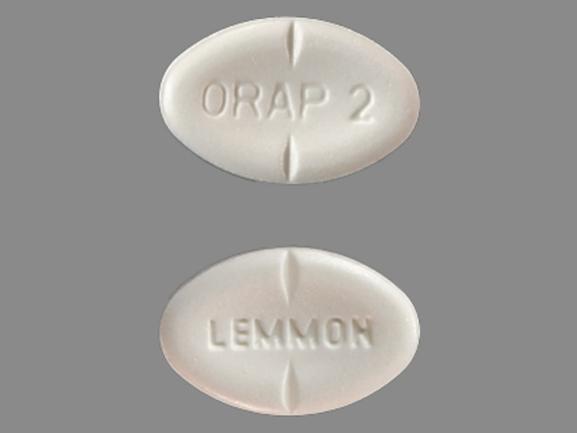Orap Interactions
There are 755 drugs known to interact with Orap (pimozide), along with 18 disease interactions, and 1 alcohol/food interaction. Of the total drug interactions, 350 are major, 397 are moderate, and 8 are minor.
- View all 755 medications that may interact with Orap
- View Orap alcohol/food interactions (1)
- View Orap disease interactions (18)
Most frequently checked interactions
View interaction reports for Orap (pimozide) and the medicines listed below.
- Abilify (aripiprazole)
- amlodipine
- baclofen
- Benadryl (diphenhydramine)
- Botox (onabotulinumtoxinA)
- BuSpar (buspirone)
- citalopram
- clonazepam
- clonidine
- CoQ10 (ubiquinone)
- Cymbalta (duloxetine)
- Depakote ER (divalproex sodium)
- Fioricet (acetaminophen / butalbital / caffeine)
- Geodon (ziprasidone)
- Haldol (haloperidol)
- ibuprofen
- Imitrex (sumatriptan)
- Klonopin (clonazepam)
- levothyroxine
- melatonin
- metformin
- metoprolol
- naproxen
- omeprazole
- propranolol
- Risperdal (risperidone)
- Seroquel (quetiapine)
- trazodone
- Zoloft (sertraline)
- Zyprexa (olanzapine)
Orap alcohol/food interactions
There is 1 alcohol/food interaction with Orap (pimozide).
Orap disease interactions
There are 18 disease interactions with Orap (pimozide) which include:
- dementia
- CNS depression/coma
- previous neuroleptic malignant syndrome (NMS)
- seizure disorders
- acute alcohol intoxication
- CNS depression
- NMS
- pituitary tumors
- QT interval prolongation
- tics
- seizure
- hyperprolactinemia/breast cancer
- neutropenia
- anticholinergic effects
- hyperprolactinemia
- parkinsonism
- tardive dyskinesia
- renal/liver disease
More about Orap (pimozide)
- Orap consumer information
- Compare alternatives
- Reviews (17)
- Drug images
- Side effects
- Dosage information
- During pregnancy
- Drug class: miscellaneous antipsychotic agents
- Breastfeeding
Related treatment guides
Drug Interaction Classification
| Highly clinically significant. Avoid combinations; the risk of the interaction outweighs the benefit. | |
| Moderately clinically significant. Usually avoid combinations; use it only under special circumstances. | |
| Minimally clinically significant. Minimize risk; assess risk and consider an alternative drug, take steps to circumvent the interaction risk and/or institute a monitoring plan. | |
| No interaction information available. |
See also:
Further information
Always consult your healthcare provider to ensure the information displayed on this page applies to your personal circumstances.


